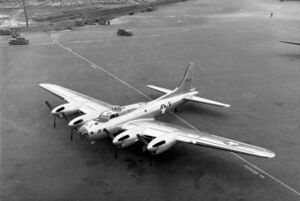Engineering:Boeing XB-38 Flying Fortress
| XB-38 Flying Fortress | |
|---|---|

| |
| Role | Strategic bomber |
| Manufacturer | Boeing (B-17E aircraft)/Vega (modifications) |
| First flight | 19 May 1943 |
| Retired | 16 June 1943 |
| Status | Cancelled |
| Primary user | United States Army Air Forces |
| Number built | 1 |
| Developed from | Boeing B-17 Flying Fortress |
The XB-38 Flying Fortress was a single example conversion of a production B-17E Flying Fortress, testing whether the Allison V-1710 V type engine could be substituted for the standard Wright R-1820 radial engine during early World War II.
Design and development
The XB-38 was the result of a modification project undertaken by Vega (a subsidiary of Lockheed) on a Boeing B-17 Flying Fortress to fit it with liquid-cooled Allison V-1710-89 V-12 engines. It was meant as an improved version of the B-17, and a variant that could be used if air-cooled Wright R-1820 radial engines became scarce. Completing the modifications took less than a year, and the XB-38 made its first flight on May 19, 1943. Only one prototype was built, and it was developed from an existing B-17 bomber.[1]
While the XB-38 delivered a substantially higher top speed, its service ceiling was lower. After a few flights it had to be grounded due to a problem with engine manifold joints leaking exhaust gases. Following the fixing of this problem, testing continued until the ninth flight on June 16, 1943. During this flight, the third (right inboard) engine caught fire, and the crew was forced to bail out. The XB-38 was destroyed and the project was canceled, in part because the V-1710 engines were needed for other projects such as the Lockheed P-38 Lightning, Bell P-39 Airacobra, Curtiss P-40 Warhawk, North American P-51A Mustang, and Bell P-63 Kingcobra fighters.
Operators
 United States
United States
Specifications (XB-38)
Data from Lockheed Aircraft since 1913.[2]
General characteristics
- Crew: 10
- Length: 74 ft 0 in (22.56 m)
- Wingspan: 103 ft 11 in (31.67 m)
- Height: 19 ft 2 in (5.84 m)
- Wing area: 1,420 sq ft (131.9 m2)
- Empty weight: 34,750 lb (15,762 kg)
- Gross weight: 56,000 lb (25,401 kg)
- Max takeoff weight: 64,000 lb (29,030 kg)
- Powerplant: 4 × Allison V-1710-97 turbosupercharged liquid-cooled V12 engines, 1,425 hp (1,063 kW) each
Performance
- Maximum speed: 327 mph (526 km/h, 284 kn) at 25,000 ft (7,600 m)
- Cruise speed: 226 mph (364 km/h, 197 kn)
- Range: 3,300 mi (5,310 km, 2,870 nmi)
- Service ceiling: 29,600 ft (9,020 m)
Armament
- Guns: 10× .50 in (12.7 mm) Browning M2 machine guns
- Bombs: 6,000 lb (2,700 kg)
See also
Related development
- B-17 Flying Fortress
- XB-39 Superfortress
Related lists
- List of bomber aircraft
- List of military aircraft of the United States
References
- Notes
- ↑ "Vega XB-38". http://www.joebaugher.com/usaf_bombers/b17_9.html.
- ↑ Francillon 1982, p.215.
- Bibliography
- Francillon, René J. Lockheed Aircraft since 1913. London:Putnam, 1982. ISBN:0-370-30329-6.
- Hess, William N. and Jim Winchester. ""Boeing B-17 Flying Fortress:Queen of the Skies". Wings Of Fame. Volume 6. London:Aerospace Publishing, 1997. ISBN:1-874023-93-X. ISSN 1361-2034. pp. 38–103.
- Jones, Lloyd S. U.S. Bombers, B-1 1928 to B-1 1980s. Fallbrook, CA: Aero Publishers, 1962, second edition 1974. ISBN:0-8168-9126-5.
External links
 |

